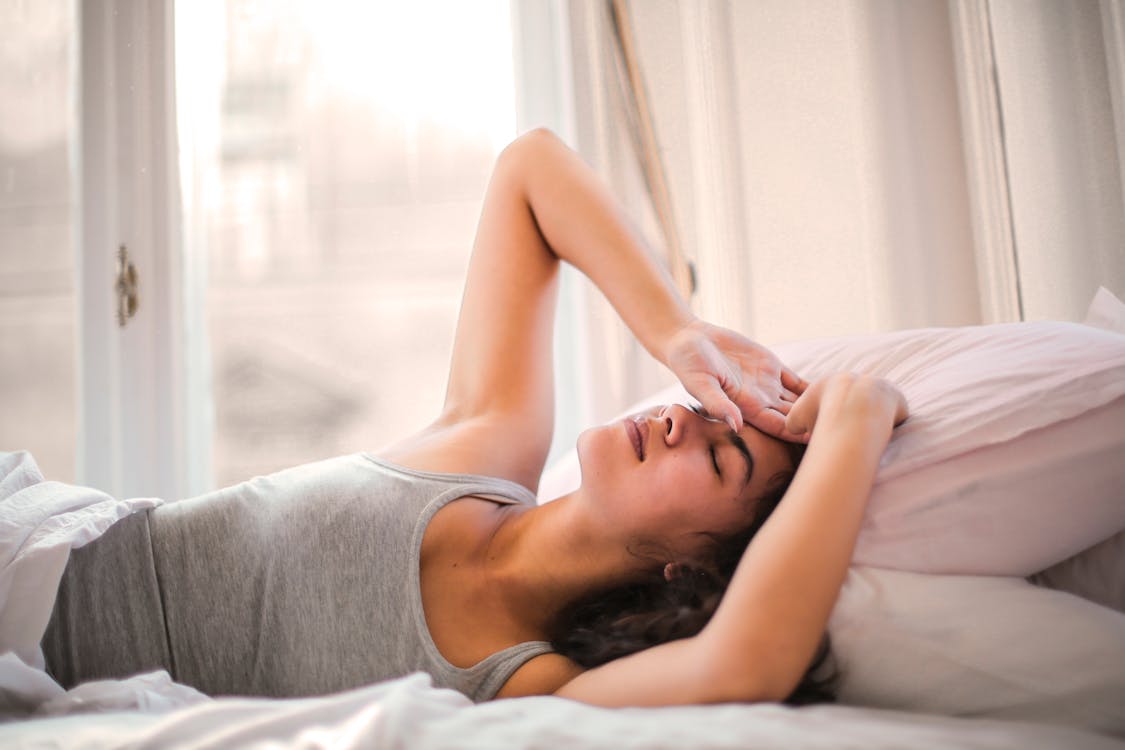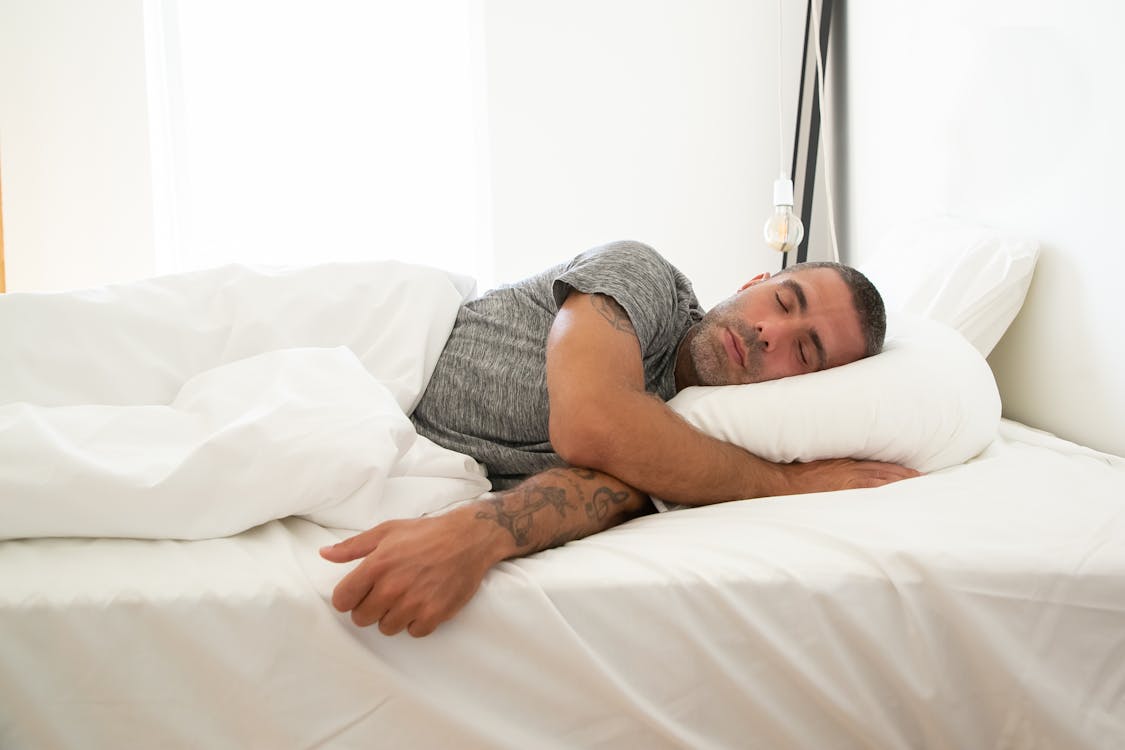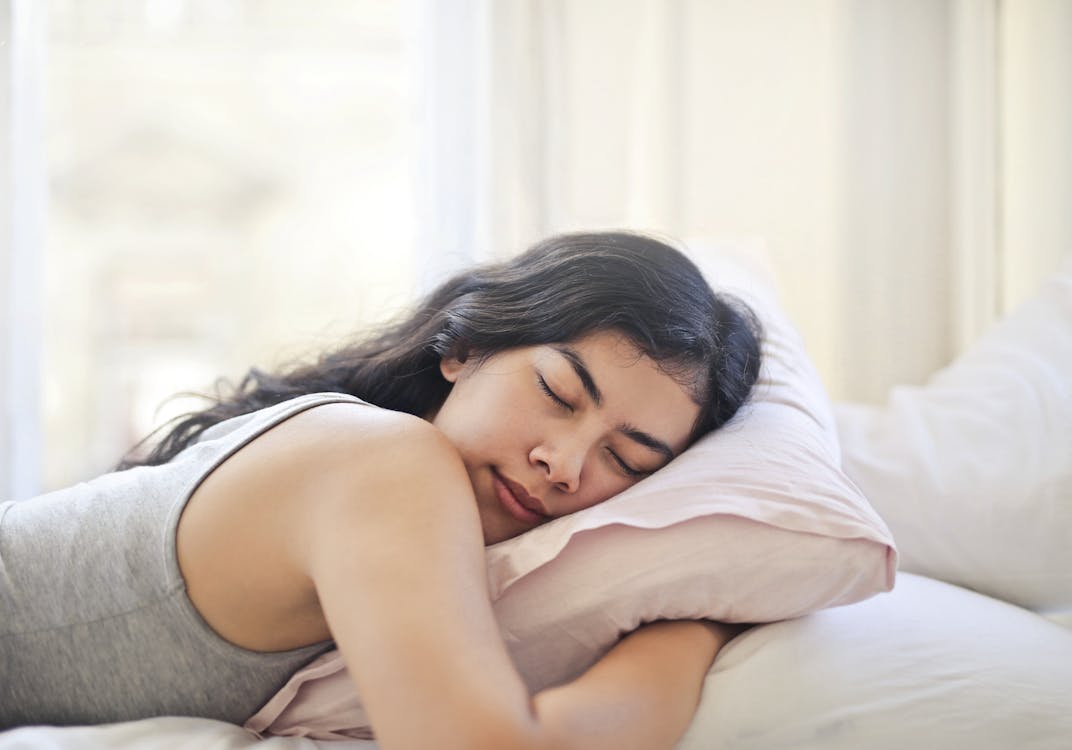For some, sleep brings sweet dreams and comfort. But for others, it's a nightly battle against overheating. If you constantly wake up drenched in sweat, tossing and turning in a desperate search for coolness, you might be a chronic hot sleeper. This isn't just a summer inconvenience – it's a year-round condition that can disrupt your sleep and leave you feeling exhausted.
This blog dives deep into how hot sleepers can manage night-time discomfort. We'll explore the reasons why we feel hot at night and burn up in our beds, and equip you with effective strategies to conquer nighttime discomfort. So, get ready to ditch the restless nights and embrace the cool, restful sleep you deserve.

The science behind sleeping hot at night
Ever toss and turn all night because you're just too hot? Do you thinkg why do I feel hot while sleeping at night? You're not alone. Hot temperatures can wreak havoc on your sleep for a few reasons.
Our bodies have a natural nightlight called the circadian rhythm. This rhythm controls not just when we feel sleepy but also our body temperature. Normally, our temperature dips a bit at night to help us doze off. But if the room is a furnace, or you're piled under heavy blankets, this cooling process gets thrown off, making it tough to find comfort.
Hormones play a big role too. Melatonin, a hormone produced in darkness, makes you drowsy and helps lower your body temperature. But if your surroundings are scorching, melatonin might not be able to bring your temperature down enough for a restful sleep.
On top of that, stress hormones like cortisol can disrupt your sleep. High cortisol levels make it hard to fall asleep and can even raise your body temperature. Feeling stressed, anxious, or consuming caffeine or sugary drinks before bed can all boost cortisol and mess with your sleep.
Lastly, some health issues and habits can make you feel hotter at night. Conditions like an overactive thyroid can crank up your body temperature. Drinking alcohol, eating heavy meals close to bedtime, or exercising right before bed can also make you feel warmer and hinder a good night's sleep.
So, what can you do? Keeping your bedroom cool, managing stress, and avoiding heavy meals or alcohol before bed are all great steps to take back control of your sleep and finally conquer those hot nights.

Also read our blog on how to turn flat bed sheet into fitted bed sheet.
What are the reasons to feel discomfort or hotness at night?
Do you also think why do I feel hot at night? People who experience discomfort or hotness at night while sleeping can be broadly divided into two categories:
- Environmental Hot Sleepers:
These are people who tend to get hot due to external factors in their sleep environment. This is the most common scenario and can happen to anyone. Here's a breakdown of the reasons:
- Room Temperature and Humidity: A bedroom that's too warm (above 66°F or 19°C) or has high humidity can trap heat and make you feel uncomfortably hot.
- Bedding and Sleepwear: Thick comforters, blankets made of heat-trapping materials like flannel, and even heavy pyjamas can insulate your body and cause overheating.
- Pre-sleep Activities: Eating spicy food, having a hot shower, or working out right before bed can elevate your body temperature and make it harder to cool down during sleep.
- Chronic Hot Sleepers:
These individuals experience night sweats and overheating even in cool environments. Here, the cause is often internal and can be related to several factors:
- Hormonal Fluctuations: Changes in hormone levels, particularly during pregnancy, menopause, or due to certain medical conditions like hyperthyroidism, can disrupt the body's natural temperature regulation.
- Metabolism: People with a higher metabolic rate tend to burn calories at a faster pace, which can generate more heat and contribute to feeling hot at night.
- Medications: Certain medications, like antidepressants or some pain relievers, can have side effects that include night sweats or hot flashes.
- Underlying Medical Conditions: Some medical conditions like sleep apnea, anxiety disorders, or certain infections can also cause night sweats and temperature regulation issues.
Additionally:
- Age: As we age, our bodies become less efficient at regulating temperature, making some older adults more prone to feeling hot at night.
- Genetics: There's some evidence that a predisposition to hot sleeping can run in families.
Important Note: If you experience frequent night sweats or unexplained hot flashes, it's important to consult a doctor to rule out any underlying medical conditions.

Also read our blog on your guide to cool and comfortable sleep this summer season.
Why do you feel sweaty at night?
The most common type of discomfort for hot sleepers is sweating at night. But why do you sweat at night? Let's get to know the reasons behind it:
- Overheating: This is the most common reason. If your bedroom is too warm (above 66°F or 19°C), has high humidity, or you're piled under heavy blankets, your body will naturally sweat to cool down.
- Bedding and Sleepwear: Thick, heat-trapping materials like flannel pyjamas or comforters can insulate you and make you sweat.
- Hormonal Fluctuations: Changes in hormone levels, particularly during pregnancy, menopause, or due to conditions like hyperthyroidism, can disrupt your body's temperature regulation, leading to night sweats.
- Medications: Certain medications, like antidepressants or some pain relievers, can have side effects that include night sweats or hot flashes.
- Underlying Medical Conditions: Medical issues like sleep apnea, anxiety disorders, infections (tuberculosis, HIV), or some cancers can cause night sweats as a symptom.

Take a look at our blog on cotton bed sheets vs microfiber bed sheets.
How can you sleep cool at night?
Do you constantly wake up drenched in sweat, tossing and turning in a desperate search for coolness? If so, you're not alone. Many people struggle with night sweats and overheating while sleeping. Here are some tips to sleep cool at night.
Bedding Tips for hot sleepers
- Breathable Bedding is Key: Swap out heavy comforters for lightweight, breathable blankets made from natural fibres like organic cotton or linen. These fabrics allow for better air circulation and prevent heat-trapping.
- Embrace Organic Cotton Bed Sheets: Belong’s Organic cotton sheets are naturally soft and breathable, promoting better air circulation and moisture absorption compared to traditional cotton. They can significantly improve comfort and reduce night sweats.
- Moisture-Wicking Pajamas: Ditch those heavy flannel PJs! Opt for loose-fitting pyjamas made from moisture-wicking fabrics like organic cotton or linen. These will draw sweat away from your skin, keeping you cooler and drier throughout the night.
- Consider a Cooling Mattress Pad: Explore cooling mattress pads or toppers that help regulate body temperature. Gel-infused pads offer a cool-to-the-touch feel, while water-filled pads allow for temperature adjustment. Some pads even use phase-change materials to absorb and release heat throughout the night.
Temperature Hacks for hot sleepers
The Temperature Sweet Spot: Aim for a bedroom temperature between 60-67°F (15.5-19.5°C). This is the ideal range for promoting sleep and preventing overheating.
- Embrace Air Circulation: Invest in a ceiling fan or strategically placed box fan to circulate air and create a windchill effect. Consider opening windows at night if the outside air is cooler than your room.
- Block the Heat: Keep sunlight out during the day with blackout curtains to prevent your room from heating up.
Smart Sleep Habits for Nighttime Comfort
- Pre-sleep Cool Down: Avoid strenuous exercise, spicy meals, and hot showers close to bedtime as they can raise your body temperature. Opt for calming activities like reading or taking a lukewarm bath to relax before sleep.
- Hydration is Key: Stay hydrated throughout the day, but avoid excessive fluids right before bed. Having a cool glass of water by your bedside can help regulate temperature if you wake up feeling hot.
- Manage Stress and Anxiety: If stress or anxiety contributes to your night sweats, practising relaxation techniques like deep breathing or meditation before bed can be helpful.
- Dietary Tweaks: Certain foods, especially spicy dishes, can trigger night sweats. Experiment with eliminating potential triggers from your evening meals.
- Seek Medical Advice: If your night sweats are severe or accompanied by other symptoms, consult a doctor to rule out any underlying medical conditions.
Belong’s 100% organic cotton bed sheets are Made with a luxurious 200 thread count, these breathable bed sheets are perfect for hot sleepers. The natural fibres of organic cotton wick away moisture and allow air to circulate, keeping you cool and comfortable all night long. Opt for our white, beige, or pink sheets to maximise coolness. Lighter colours reflect heat, while darker colours absorb it, making you feel warmer. Our organic cotton sheets are not only gentle on your skin but also environmentally friendly.
All in All
So there you have it, hot sleepers! No more tossing and turning in a sweaty mess. By implementing the tips and tricks we've explored – from creating a cool sleep environment to adopting smart sleep habits – you can conquer nighttime discomfort and achieve the restful sleep you deserve. Remember, a little effort goes a long way. Embrace the power of cool bedding, strategic airflow, and a relaxing pre-sleep routine. You might be surprised at how a few tweaks can transform your nights and leave you feeling refreshed and energised each morning.
FAQs
1. Is it normal to sweat at night?
Yes, night sweats are a natural way for your body to regulate temperature. However, excessive or frequent night sweats can be a sign of an underlying medical condition. If you're concerned about the severity of your night sweats, consult a doctor.
2. What are some cooling mattress pad options for hot sleepers?
There are several cooling mattress pad options available. Gel-infused pads offer a cool-to-the-touch feel, while water-filled pads can be adjusted to your desired temperature. Some pads even use phase-change materials that absorb and release heat to regulate your body temperature throughout the night.
3. Will a ceiling fan actually cool me down at night?
Yes, a ceiling fan can help circulate air and create a windchill effect, making you feel cooler. For best results, position the fan to blow directly across your body as you sleep. Remember, a fan won't actually lower the room temperature, so it's most effective when used in conjunction with other cooling strategies.
4. Should I take a cold shower before bed to cool down?
While a lukewarm shower can be relaxing before bed, a cold shower might not be the best idea. A sudden drop in temperature can actually trigger your body to generate more heat to warm up again. Opt for a tepid shower to cool down slightly and promote relaxation for sleep.
5. What kind of pyjamas are best for night sweats?
Loose-fitting pyjamas made from breathable, moisture-wicking fabrics like organic cotton or linen are ideal for hot sleepers. These fabrics allow for better air circulation and absorb moisture away from your skin, keeping you cooler and drier throughout the night.
6. I've tried everything, but I still wake up drenched in sweat. What should I do?
If you've implemented several cooling strategies and still experience excessive night sweats, consult a doctor. They can help identify any underlying medical conditions that might be contributing to your night sweats and recommend appropriate treatment options.
Written by Shivangi Singh
References:
https://www.healthline.com/health/sleep/best-temperature-to-sleep#the-science


